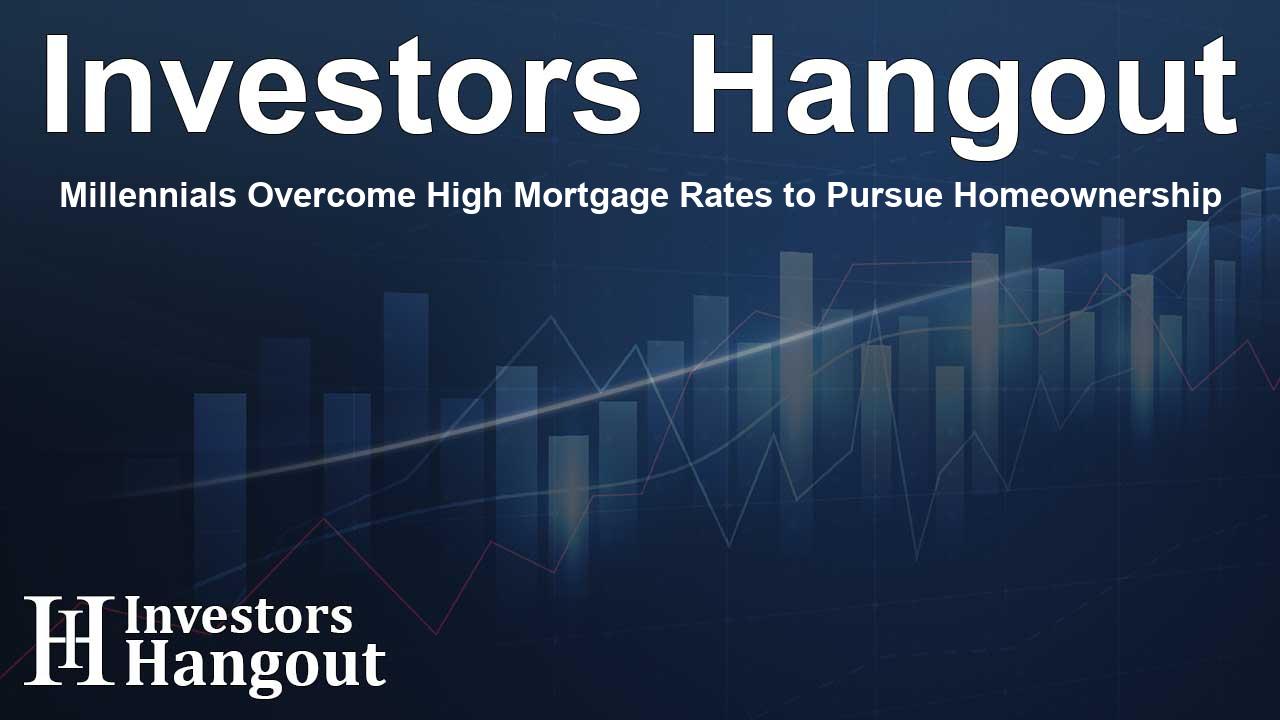Millennials Overcome High Mortgage Rates to Pursue Homeownership

Millennials Show Increased Interest in Buying Homes
Recent findings reveal that Millennials are increasingly interested in purchasing homes, even with high mortgage rates. A significant survey indicates that their intention to buy has surged from 15% to 23%. This is noteworthy amid the broader market where most Americans, about 69%, are not considering a real estate transaction in the coming six months.
The Lock-In Effect of Mortgage Rates
"Despite the persistent challenges posed by high mortgage rates, Millennials are demonstrating a growing aspiration for home ownership this season compared to last year," stated Laura Eddy, Vice President of Research and Insights at Realtor.com. She highlighted the critical role mortgage rates play, as many Americans prioritize obtaining lower rates before making a purchase. This phenomenon, dubbed the lock-in effect, continues to dominate the housing market.
Impact on Younger Generations
High mortgage rates are causing significant shifts in buying behavior. One-third of survey participants said they have delayed their plans to buy a home due to these rates. This sentiment is especially prevalent among younger generations, with over half of both Millennials and Gen Z postponing their purchases. Gen Z appears particularly hesitant, showing a preference for renting while delaying home purchases amid the high-rate environment.
Influence of Rates on Decision-Making
Overall, the influence of mortgage rates on buying decisions is pronounced, with over two-thirds of respondents acknowledging the impact. In contrast, Baby Boomers display less sensitivity, with 41% stating that rates do not significantly affect their purchasing decisions. A mere 2% would consider a home purchase if rates exceed 6%, while 63% are seeking rates below 5% before they would act.
Financing Home Purchases
The survey also unveiled insights into how prospective homebuyers plan their finances. A majority, 57%, across all generations rely on personal savings, while 15% tap into personal investments or retirement accounts for their home purchases. Additionally, about 12% reported receiving financial assistance through gifts or loans from family members. Among future buyers, 25% intend to use their retirement accounts or investments as financing sources.
Expectations for the Future
Hannah Jones, a Senior Research Analyst at Realtor.com, expressed concern about the current housing landscape. She pointed out that many buyers feel trapped by their existing mortgage rates, complicating their ability to transition to new homes. High rates, coupled with a lack of affordable properties, create barriers, especially for first-time buyers who lack the equity needed for more favorable financing.
Seller Sentiment and Market Dynamics
In an exploration of seller dynamics, a recent survey illuminated similar feelings among potential sellers. Many feel 'locked-in' due to existing mortgage rates. Over three-quarters of sellers believe that interest rates will remain the same or increase over the next year. Among those anticipating rate increases, 43% indicated that this expectation may drive them to sell, while 20% stated a rate hike would deter their selling plans.
Motivations Behind Selling
Interestingly, potential sellers who believe in declining rates are motivated to list their homes, with 69% stating it would increase their likelihood of selling. Thus, the expectations around interest rates appear to significantly influence seller behavior, underscoring the interconnectedness of buyer and seller sentiments in the real estate market.
Frequently Asked Questions
What recent trends have been observed among Millennials regarding home buying?
Millennials have shown an increased interest in buying homes, with their buying intention rising from 15% to 23% despite high mortgage rates.
How do mortgage rates affect buyers and sellers in the current market?
High mortgage rates have caused many buyers, especially Millennials, to delay purchases. Sellers feel 'locked in,' impacting their decision to list homes.
What financial resources do potential homebuyers rely on?
The majority of potential homebuyers rely on personal savings, with some using investments or assistance from family members.
What is the lock-in effect?
The lock-in effect refers to the phenomenon where homeowners are reluctant to sell and purchase new homes due to unfavorable existing mortgage rates.
How do Baby Boomers differ in their home buying behavior compared to younger generations?
Baby Boomers are less influenced by mortgage rates, with 41% stating it does not affect their purchasing decisions, contrasting with younger generations who are more sensitive to rate changes.
About The Author
Contact Dominic Sanders privately here. Or send an email with ATTN: Dominic Sanders as the subject to contact@investorshangout.com.
About Investors Hangout
Investors Hangout is a leading online stock forum for financial discussion and learning, offering a wide range of free tools and resources. It draws in traders of all levels, who exchange market knowledge, investigate trading tactics, and keep an eye on industry developments in real time. Featuring financial articles, stock message boards, quotes, charts, company profiles, and live news updates. Through cooperative learning and a wealth of informational resources, it helps users from novices creating their first portfolios to experts honing their techniques. Join Investors Hangout today: https://investorshangout.com/
The content of this article is based on factual, publicly available information and does not represent legal, financial, or investment advice. Investors Hangout does not offer financial advice, and the author is not a licensed financial advisor. Consult a qualified advisor before making any financial or investment decisions based on this article. This article should not be considered advice to purchase, sell, or hold any securities or other investments. If any of the material provided here is inaccurate, please contact us for corrections.
